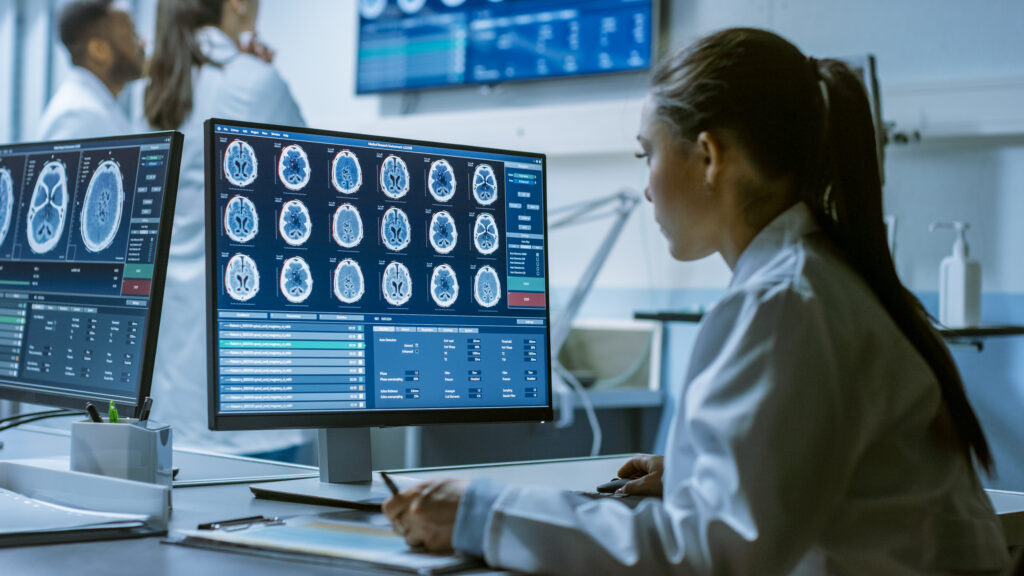Australia needs to commit to more research examining the neurological symptoms that can result from COVID-19.
Clinicians and researchers still have more to learn about the neurological symptoms that can result from coronavirus disease 2019 (COVID-19), according to a Narrative Review published today in the Medical Journal of Australia.
Neurological symptoms are not uncommon during severe acute respiratory syndrome coronavirus 2 (SARS-CoV-2) infection and reflect a broad spectrum of neurological disorders, which doctors should be aware of, writes Dr Robb Wesselingh, a research fellow at the Department of Neuroscience at Monash University.
“Neurological manifestations of acute COVID-19 include headache, peripheral neuropathies, seizures, encephalitis, Guillain–Barré syndrome, and cerebrovascular disease,” Dr Wesselingh wrote.
“Commonly reported long term neurological sequelae of COVID-19 are cognitive dysfunction and dysautonomia, which despite being associated with severe acute disease are also seen in people with mild disease.”

Gaps remain in the research
In an interview with InSight+ about his research, Dr Wesselingh said his work was prompted by his previous involvement in reviews examining this topic.
“I was involved in a few previous reviews evaluating the intersection of neurology and COVID-19 at the very start of the COVID-19 pandemic and these had posed some interesting questions around COVID-19 and the types of neurological illness that it may cause, as well as the long term implications of infection,” Dr Wesselingh said.
“I was keen to follow upon these questions now there has been three years of research, help my peers understand where our current understanding was at, and highlight the ongoing gaps that remain.”
Registries collecting neurological information
An Australian registry collecting information about neurological conditions associated with COVID-19 was set up early in the pandemic but later had to close, Dr Wesselingh said.
“Internationally, many of the registries started quite early on in 2020, largely prompted by the initial reports of loss of smell and taste, and some of the animal studies, which suggested that viruses such as [severe acute respiratory syndrome (SARS)] could invade the brain through the olfactory nerve,” Dr Wesselingh said.
“Many of these registries expanded, after a seminal study out of Wuhan [China] demonstrated a wider variety of possible neurological complications during COVID-19 infection and are ongoing.
“We started an Australian Neuro-COVID-19 Registry at Monash University in mid-2020 but, due to the low incidence of COVID-19 infections during the initial lockdown periods, the registry never developed the momentum or funding that the international registries did and was closed in 2021.”
The risk of stroke from COVID-19
The review also examined literature about the risk of stroke from COVID-19, particularly in young people, with the review stating it is unclear whether the rate of stroke in patients with COVID-19 is different compared with the general population.
“At this stage, we probably need more information on the outcomes of stroke in young people during COVID-19 infection, and, more importantly, whether they respond to usual stroke treatments, thrombolysis and clot retrieval,” Dr Wesselingh said in his interview.
“The mechanism of stroke during COVID-19 may be different to standard stroke and may require more personalised treatment, but we won’t know that unless we commit to ongoing research in this area.”
The need for longitudinal studies
The review also stresses the need for more longitudinal studies into the long-term impact of COVID-19 on neurological diseases, a point on which Dr Wesselingh expanded during his interview.
“We absolutely need to be doing longitudinal studies in COVID-19 focused on the potential neurological sequelae, and, in particular, regarding the risk of neurodegenerative illnesses,” Dr Wesselingh said.
“Most neurodegenerative illnesses have a long lead-in time after the likely initiating event or events, so you won’t capture any potential resultant illness unless you follow patients along for at least five to ten years.
“Given the number of people across the globe who have had COVID-19 infection, even a low incidence of neurodegenerative illness post-COVID-19 would be devastating.
“Although I think it is unlikely that we will see this scenario play out, there remains a strong need for more research and funding in this area.”
Read the Narrative Review in the Medical Journal of Australia.
Subscribe to the free InSight+ weekly newsletter here. It is available to all readers, not just registered medical practitioners.

 more_vert
more_vert